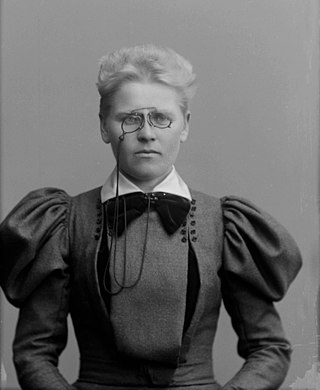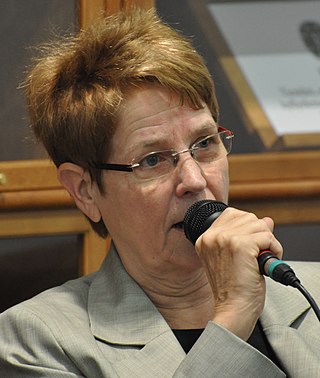Related Research Articles
Queer studies, sexual diversity studies, or LGBT studies is the study of topics relating to sexual orientation and gender identity usually focusing on lesbian, gay, bisexual, transgender, gender dysphoria, asexual, queer, questioning, intersex people and cultures.

The University of Helsinki is a public research university located in Helsinki, Finland, since 1829, but founded in the city of Turku in 1640 as the Royal Academy of Åbo, at that time part of the Swedish Empire. It is the oldest and largest university in Finland with the widest range of disciplines available. In 2020, around 31,600 students were enrolled in the degree programs of the university spread across 11 faculties and 11 research institutes.

Liisi Oterma was a Finnish astronomer, the first woman to get a Ph.D. degree in astronomy in Finland.

Urvashi Vaid was an Indian-born American LGBT rights activist, lawyer, and writer. An expert in gender and sexuality law, she was a consultant in attaining specific goals of social justice. She held a series of roles at the National LGBTQ Task Force. She is the author of Virtual Equality: The Mainstreaming of Gay and Lesbian Liberation (1995) and Irresistible Revolution: Confronting Race, Class and the Assumptions of LGBT Politics (2012).

Gayle S. Rubin is an American cultural anthropologist, theorist and activist, best known for her pioneering work in feminist theory and queer studies.
The International Lesbian Information Service (ILIS) was an international organization which aimed at fostering international lesbian organizing. It was started within ILGA in 1980. The following year, at a separate lesbian conference arranged prior to the ILGA Turin conference, lesbian organizations decided that ILIS should become a separate organization.
This article is about lesbian, gay, bisexual and transgender (LGBT) history in Finland.

Jeanne Córdova was an American trailblazer of the lesbian and gay rights movement, founder of The Lesbian Tide, and a founder of the West Coast LGBT movement. Córdova was a second-wave feminist lesbian activist and proud butch.

Hilda Maria Käkikoski was a Finnish politician, writer and schoolteacher. She was one of the first nineteen women elected to Finnish parliament in 1907.
The Archives, Libraries, Museums and Special Collections (ALMS) Conference is an international event focussed on the work by public, private, academic, and grassroots organisations which are collecting, capture and preserving archives of LGBTQ+ experiences, to ensure their histories continue to be documented and share
Raija Tellervo Sollamo is a Finnish theologian and professor emerita of Biblical Languages in the Faculty of Theology, University of Helsinki. She was the first female professor in the field of theology in Finland. Between 1998 and 2003, Sollamo was vice-rector of the University of Helsinki, thereby becoming the first female vice-rector in Finland. From 2007 to 2010, she was president of The International Organization for the Study of the Old Testament (IOSOT).

Kersti Anna Linnea Juva is a Finnish translator, recognized in particular for her translation into Finnish of J.R.R. Tolkien's The Lord of the Rings trilogy, for which she won the State Prize for Literature in 1976. Her translations of Shakespeare have been acclaimed for preserving the iambic pentameter of the verses. She was awarded the Mikael Agricola Translation Prize by the Finnish Association of Translators and Interpreters and Finnish Book Foundation for her translations of The Life and Opinions of Tristram Shandy, Gentleman in 1999. In 2014, she was inducted into the European Science Fiction Society's Hall of Fame for her translation work. An open lesbian, she is a vocal advocate for the homosexual community in Finland.

Maria (Maikki) Elisabeth Friberg (1861–1927) was a Finnish educator, journal editor, suffragist and peace activist. She is remembered for her involvement in the Finnish women's movement, especially as chair of the Finnish women's rights organisation Suomen Naisyhdistys and as the founder and editor of the women's journal Naisten Ääni. She travelled widely, promoting understanding of Finland abroad while participating in international conferences and contributing to the foreign press.
Elina Haavio-Mannila is a Finnish social scientist and Professor Emerita of Sociology at the University of Helsinki where she served as the Docent of Sociology (1965–1971), Assistant Professor (1971–1992), and Professor (1992–1998). She is known for researching gender roles and gender in Finnish life. Much of the research in the latter field was done together with Osmo Kontula. In 1958, she became the first woman in Finland to earn the Doctor in Social Sciences degree.
Eugenie Lisitzin was a Finnish physical oceanographer active in the mid-20th century. She was the first woman in Finland to earn a PhD in physics (1938) and join the Finnish Society of Sciences and Letters (1960). She also was the first acting director of a scientific department of the Finnish government.
Aili Annikki Nenola is professor emerita of the University of Helsinki. Her research specialty was folklore and she pioneered multidisciplinary and critical women's studies in Finland, designing the curricula and introducing courses at the University of Tartu. She later assisted in establishing the national curricula for women's studies, became director of the graduate program in women's studies at the Kristiina Institute, and secured accreditation of the field as a degree major. Nenola was also a participant in creating the curriculum of the Women's Studies Centre of Vilnius, Lithuania. From 1995 to 2006 she taught women's studies at the University of Helsinki and simultaneously served as the Dean of the Faculty of Humanities between 2004 and 2006. In 1999, Nenola was honored as a Knight, first class, of the Order of the White Rose of Finland and was elected to the Finnish Academy of Science and Letters in 2002.
Brenda G. Corbin is a retired American astronomy librarian who worked for many years as the librarian of the James M. Gillis Library in the United States Naval Observatory, and who is known for founding the Library and Information Services in Astronomy (LISA) conference series. She was honored in 2020 by being named a Legacy Fellow of the American Astronomical Society.

Olena Olehivna Shevchenko is a Ukrainian women's and LGBT rights activist. After working as a teacher, she co-founded the NGO Insight in 2007 to advocate for LGBT inclusiveness on feminist platforms. She started annual events including Women's Day March, Transgender Day of Remembrance and the Festival of Equality, to protest against discrimination against women and the LGBT community in Ukraine and in other former Soviet countries. Her opponents have repeatedly attacked her and her events.
References
Citations
- ↑ University of Helsinki 2020.
- 1 2 Hiltunen 2014, p. 1.
- 1 2 Isaksson 2018.
- 1 2 The Body Politic 1981, p. 16.
- 1 2 3 4 5 6 University of Helsinki 1999.
- ↑ Holmberg 2005, p. 132.
- ↑ Wilson 2022, p. 127.
- ↑ Wilson 2022, pp. 126–127.
- 1 2 European Lesbian Conference 2017.
- ↑ Wilson 2022, pp. 135–136.
- 1 2 3 Zimmerman 2000, p. xxxi.
- 1 2 Itkonen 1999.
- ↑ Ellis et al. 2002, pp. 28–29.
- 1 2 Chaplin 2014, p. 455.
- ↑ Litoff & Smith 1991, p. 313.
- ↑ Hiltunen 2014, p. 2.
- ↑ ALMS Conference 2019.
Bibliography
- Chaplin, Tamara (September 2014). "Lesbians Online: Queer Identity and Community Formation on the French Minitel". Journal of the History of Sexuality. Austin, Texas: University of Texas Press. 23 (3): 451–472. doi:10.7560/JHS23305. ISSN 1043-4070. JSTOR 24616591. OCLC 5617727965. S2CID 143380806 . Retrieved 1 June 2022.
- Ellis, Alan; Highleyman, Liz; Schaub, Kevin; White, Melissa, eds. (2002). "Major LGBTQ Non-Web Resources: Lesbian Mailing Lists (www.lesbian.org)". The Harvey Milk Institute Guide to Lesbian, Gay, Bisexual, Transgender, and Queer Internet Research. New York, New York: Harrington Park Press. pp. 28–29. ISBN 978-1-56023-352-7.
- Hiltunen, Helena (18 December 2014). "Kirjaston kasvoja: Eva Isaksson" [Faces of the Library: Eva Isaksson]. Verkkari (in Finnish). Helsinki, Finland: University of Helsinki (4). hdl:10138/170838. ISSN 1456-2979 . Retrieved 1 June 2022.
- Holmberg, Peter (2005). Viktor Theodor Homén: vetenskapsman och politiker[Viktor Theodor Homén: Scientist and Politician] (in Finnish). Helsinki, Finland: Finska vetenskaps-societeten. p. 132. ISBN 978-951-653-335-6.
Isaksson, E. (1980). Gunnar Nordströmin elämäntyö – kaksi gravitaation skalaari teoriaa. Pro gradu, Helsingin yliopisto
- Isaksson, Eva (October 2018). "Sateenhistoriakuukausi 2018: päivitykset / Rainbow History Month 2018: Links". sappho.net. Helsinki, Finland. Archived from the original on 31 May 2022. Retrieved 31 May 2022.
- Itkonen, Leena (1999). "Equality Prize to Eva Isaksson for Women's Data Networks". Helsinki, Finland: University of Helsinki. Archived from the original on 27 September 2011. Retrieved 1 June 2022.
- Litoff, Judy Barrett; Smith, David C. (Spring 1991). "Review Essay: Women at War with Militarism, Part One: Setting the Stage". NWSA Journal . Baltimore, Maryland: Johns Hopkins University Press. 3 (2): 309–315. ISSN 1040-0656. JSTOR 4316135. OCLC 5547396619 . Retrieved 1 June 2022.
- Wilson, Ann Marie (January 2022). "Dutch Women and the Lesbian International". Women's History Review . Abingdon, Oxfordshire: Routledge. 31 (1): 126–153. doi: 10.1080/09612025.2021.1954338 . ISSN 0961-2025. OCLC 9405931614. S2CID 240520862.
- Zimmerman, Bonnie, ed. (2000). Lesbian Histories and Cultures: An Encyclopedia. Encyclopedia of Lesbian and Gay Histories and Cultures. Vol. 1. New York, New York: Garland Publishing. ISBN 978-0-8153-1920-7.
- "Demonstrators Confess: They 'Encourage Homosexuality': Finns Slapped for Gay-Boosting". The Body Politic . No. 75. Toronto, Ontario: Pink Triangle Press. July–August 1981. p. 16. ISSN 0315-3606 . Retrieved 31 May 2022.
- "Eva Isaksson". European Lesbian Conference. Vienna; Austria: EuroCentralAsian Lesbian Community. 2017. Archived from the original on 21 April 2021. Retrieved 31 May 2022.
- "Isaksson, Eva". National Library of Finland (in Finnish). Helsinki, Finland: University of Helsinki. 2020. Archived from the original on 22 June 2020. Retrieved 31 May 2022.
- "Maikki Friberg Prize to Eva Isaksson". Equality Committee. Helsinki, Finland: University of Helsinki. 15 April 1999. Archived from the original on 1 June 2022. Retrieved 31 May 2022.
- "Queering Memory: ALMS Conference Berlin". Queer ALMS Berlin 2019. Berlin, Germany: ALMS Conference. 29 June 2019. Retrieved 1 June 2022.